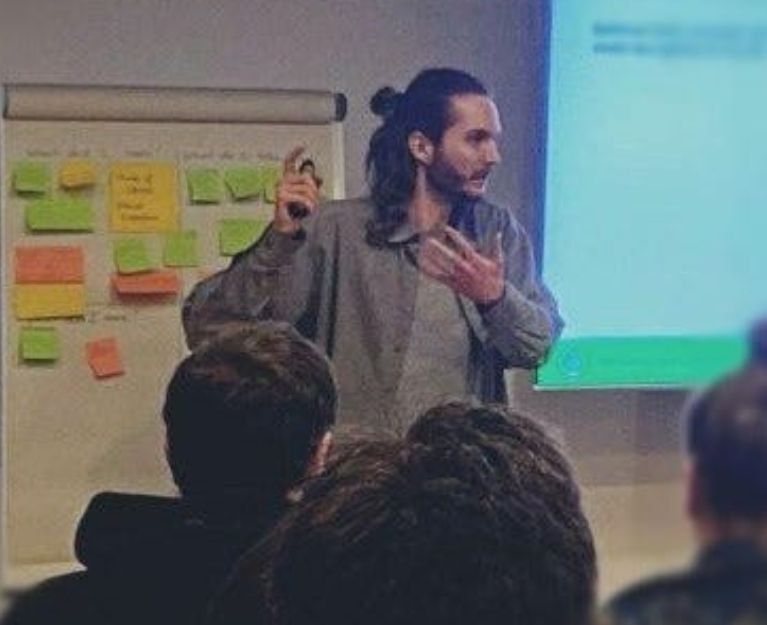Lecturer: Philipp Wicke
Fields: Cognitive Science, Computational Linguistics, AI
Content
This course examines the connection between language and thought, using the recent boom in large language models (LLMs) and AI-agents as a starting point. The course is organized into four lectures that move from theoretical foundations to practical implications and ethical considerations.
- Lecture 1 introduces the core ideas behind the course. We explore the hypothesis that our thinking is largely based on language, looking at language universals and the concept of linguistic relativity. This session sets the stage by discussing how language might serve as the basis for what we recognize as intelligence.
- Lecture 2 shifts the focus to the body’s role in shaping language and cognition. Here, we examine embodied cognition and consider how physical experience influences language conceptualization. The discussion presents the idea that language serves as an interface between raw cognitive processes and the articulation of thought—a process that is augmented in both human and machine learning, although in very different ways.
- Lecture 3 delves (!) into the technical and conceptual details of LLMs and generative agents. This lecture outlines what LLMs are designed to achieve and highlights their limitations, especially in contrast to the human learning process. By exploring the gaps between language-based AI systems and embodied human cognition, we develop a clearer understanding of current AI capabilities.
- Lecture 4 critically reviews the broader impact of agentic AI. We address how these technologies are already influencing society through issues like artificial intimacy, trust, and unexpected market dynamics. This session also examines ethical concerns and challenges the promise of fully agentic AI by considering where current implementations fall short and what this means for future development.
Together, these lectures offer an in-depth look at how language serves as a bridge between thought and action, and how both technological and human forms of intelligence can inform one another. The course is designed to engage students in discussions that are both technically rigorous and socially relevant, providing a balanced view of the promises and limitations of augmented thought in the age of AI.
(created using o3-mini with high reasoning effort and P. Wicke’s notes)
Literature
- Evans, Vyvyan, and Melanie Green. Cognitive linguistics: An introduction. Routledge, 2018.
- Boroditsky, Lera. “Does language shape thought?: Mandarin and English speakers’ conceptions of time.” Cognitive psychology 43.1 (2001): 1-22.
- Wei, Jason, et al. “Emergent abilities of large language models.” arXiv preprint arXiv:2206.07682 (2022).
- Boroditsky, Lera. “Does language shape thought?: Mandarin and English speakers’ conceptions of time.” Cognitive psychology 43.1 (2001): 1-22.
- ImaniGooghari, Ayyoob, et al. “Glot500: Scaling Multilingual Corpora and Language Models to 500 Languages.” arXiv preprint arXiv:2305.12182 (2023).
- Wicke, Philipp, Wachowiak, Lennart. “Exploring Spatial Schema Intuitions in Large Language and Vision Models” ACL 2024 Findings.
- George, A. Shaji, et al. “The Allure of Artificial Intimacy: Examining the Appeal and Ethics of Using Generative AI for Simulated Relationships.” Partners Universal International Innovation Journal 1.6 (2023): 132-147.
- Wicke, Philipp, and Marianna Bolognesi. “Emoji-based semantic representations for abstract and concrete concepts.” Cognitive processing 21.4 (2020): 615-635.
Lecturer

Philipp Wicke studied Cognitive Science at the University of Osnabrück in the B.Sc. programme. During these studies he interned at Dauwels Lab at the NTU Singapore in the field of neuroinformatics, he also interned at the Creative Language Systems Lab at UCD Dublin at which he later wrote his dissertation on “Computational Storytelling as an Embodied Robot Performance with Gesture and Spatial Metaphor” under supervisor Tony Veale. In his current role at the Center for Language and Information Processing (CIS) at LMU, Philipp is researching on Natural Language Processing and teaches programming in the B.A. and M.A. Computational Linguistics. Philipp Wicke was the Head of AI Applications of the AI for People Association, is an Associate Member of the Munich Center for Machine Learning (MCML) and the Munich Center of Linguistics (MCL). Recently, he has been awarded a Junior Researcher in Residency at the Center for Advanced Studies (CAS).
Affiliation: Center for Information and Language Processing (CIS), LMU – Munich
Homepage: www.phil-wicke.com